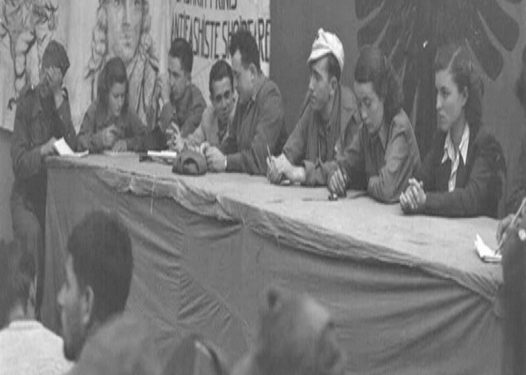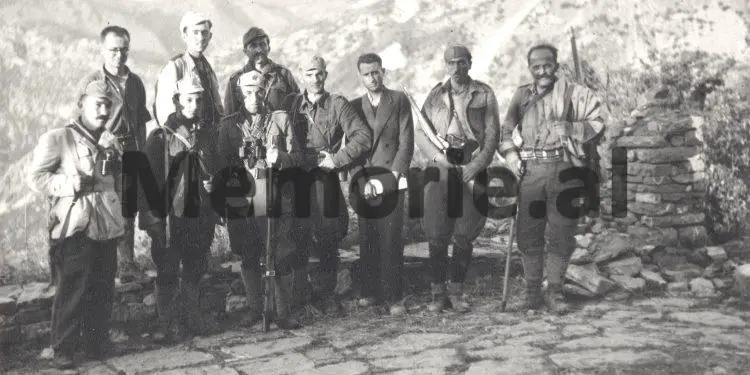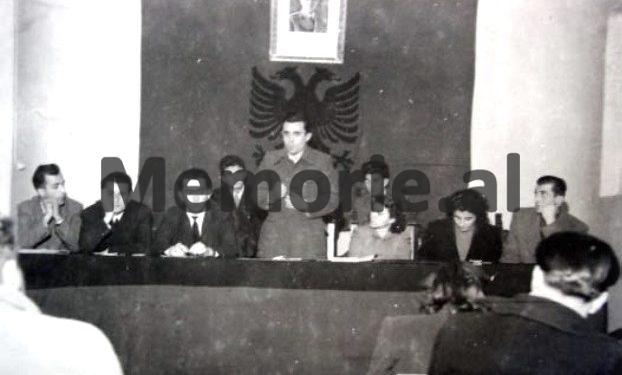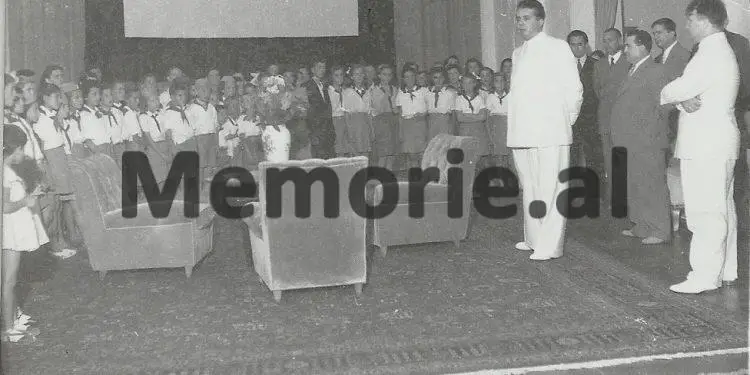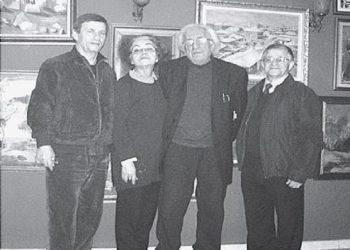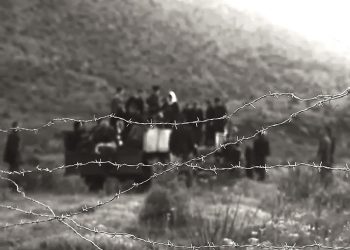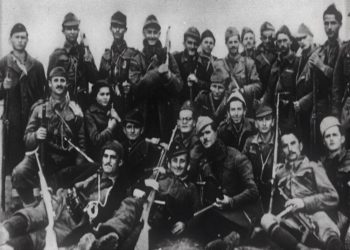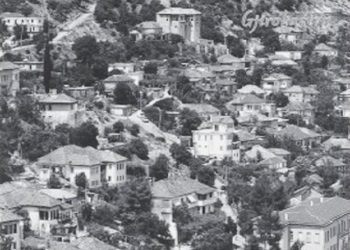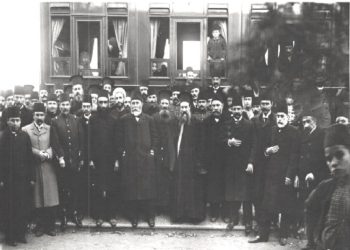By Fadil Paçrami
The first part
Memorie.al / what is prison? It is the place where those who have been sentenced to deprivation of liberty are kept, we would say by reading any dictionary. But that is little. Prison and freedom – two opposites. Previously: what is freedom? In short: to be free means to do what you want, to think and act as you wish in the exercise and fulfillment of your freedoms and rights, as a person and as a citizen, but always without harming and violating others. . Again: to think and act. We are talking about democratic freedoms, from those of speech, press, assembly and organization in various parties and associations, ensuring the conditions where ideas, requests and human wills can find expression and concretization, from those of the biological-related plan with the being itself, to those of the social plan, related to the ways of living.
A flawed and sick person is not able to think and act like any other person, as well as an individual, society and nation, if they are in poverty and living difficulties and oppressed, because they are dependent on factors and do not depend from him, such as physical, economic, cultural violence, etc. Freedom gives you the following opportunities: to think and act in accordance with philosophical, religious and political ideas, views and convictions, but under normal physical and life conditions.
It’s different in prison. There you don’t have these opportunities, they have been denied, or more precisely they have been limited, especially in acting. “Especially”, as I said above, freedom lies not only in thinking, but also in acting, not only in the possibility and power of reason, but also in turning the ideal into reality.
Now we come to: what is prison? It may seem paradoxical, but the freedom of thinking in prison takes many times (I’m talking about political convicts, who do not submit and do not lose their reason and logic under the weight of injustices, ill-treatment and all kinds of pressures that are put on them, do not abandon their convictions hopes, for the future), developments and sizes, I would say, without limits.
If when you are outside, as a member of a certain circle or society, of a political party whatever it is, even more so, if it is not democratic, without realizing it, due to inertia or disciplinary obligations to the will of the majority, you are not independent and free from them, in prison you break away, you feel independent and free from them. You start to see many things, with a different critical eye I would say, to search deep within yourself, to bring to mind and grind previous events, ideas and actions, of others, and your own. Everything has played out of place, you have been shocked, so you dig and seek to discover truths and causes, for what brought you to the end where you are.
Disappointments, disbelief, anger and rage with oneself and others are mixed here. At the same time, it divides and selects, cleans and discards the wrong, the rotten, the harmful, and the ones that did not stand the test of time. This is a difficult and painful process, but completely logical, that frees you from the burdens that have burdened you, prevented you from seeing clearly and walking straight.
This happened to me. Among other things, what I talk about below in the pages of this book, particularly shocking, are the violations and abuses that were done to the freedom of the law, in the years of the dictatorship, in our country. This is the area where the ugliest, the most violent means and forms have been acted upon, which burdened the lives of people and the country as a whole.
Life since ancient times, even the enlightened thoughts of mankind, have spoken convincingly with sound arguments and reasons, often even with anger, about the necessary usefulness of a combination of freedom, law and force. Without further ado, it is enough to remember that the problem of freedom is one of the axioms of Kant’s philosophy. According to him, the alternatives are: freedom and law without force leads to anarchy, law and force without freedom leads to despotism, force without freedom and law leads to barbarism. (For the last two, today we would say: in dictatorship) only the combination of the three gives the constitutional democratic state. What happened to us? There was talk of freedom, but there was no freedom of speech or of the press, of ideas or of conscience, nor of gathering and organizing in parties and associations as democracy provides, nor of individual initiative. What’s wrong? The state had laws, but they were built, as it was said, for the benefit and protection of “the dictatorship of the proletariat”. Even in implementation, everyone was not treated the same.
Strength prevailed. That’s how it started in the first years, from that time it was called Koci Xoxes and continued. It turns out that there were several motives: the model that was chosen for the creation of the state that had just emerged from the war – that of totalitarian socialism, the path that was followed for its consolidation and strengthening – that of suppressing the opponents by all means, the extreme centralization of the economy in the hands of the state, the measures to extinguish every voice of freedom and democratic rights, including those in defense of the nation’s interests, at a time when the processes for returning the country to a republic were accelerating the 7th of Yugoslavia.
In 1948, when the break with Belgrade happened, there was talk against what can be called the “reign of terror”. Some extremism was condemned, some of their bearers and violators of the law were blamed, and some words were said for avoiding and making mistakes in the implementation of the party line. But that was all, in fact, what was said was quickly forgotten and it continued as before, in the 50s, a little more covered; in the 60s, more openly, with further isolation from the world, further restrictions on individual freedom, the closing of religious centers, the liquidation of the Ministry of Justice and the legal profession, the excesses in the direction of the cultural revolution, etc.; in the 70s with the addition of austerity measures and trials at all levels, up to the highest ones, that terrorized the country and in the 80s, when it was felt that the end was coming, with the addition of demagoguery.
This is explained by the nature of the regime and that Stalinist-type dictatorial system, by the ferocity and ambitions for power and glory of Enver Hoxha, by the myopia and cynicism of a clan around him, incompetent and short-sighted that ruled the country. All these are, taken together and separately with the weight and influence of each who more and who less, that without words are decisive. There are others, related to historical factors and the peculiarities of the country, among which: the late creation of the state after the exit from Byzantine and Ottoman despotism, the lack of democratic traditions, poverty and the chaotic situation with the Dasis inherited from the past and that left the war, the provincialisms of the religious ones.
From these positions, therefore, and under these conditions, the totalitarian regime acted and ruled for such a long time as an all-powerful one. History still has a lot to say about everything that happened, why and how it happened. An enigma question arises here, which is often asked: only he – Enver Hoxha, managed to do everything and is responsible for everything? That he was as he has been portrayed is already known: the passionate egoist, thirsty for power and glory, the heartless and wild dictator, these are what he is and nothing matters. But are they enough and wouldn’t this be a somewhat simplified opinion, when these other factors are also known, as mentioned?
Or as in the past, all the merits were covered, and this by the primitive and deifying thoughts about the cult of the leader, which were nurtured in the dictatorial countries of the East, as well as those of the head of the tribe, the captain and the leader, cultivated for centuries among our people; are all the guilts and curses still on him today? There is here a truncated treatment of factors, both subjective and objective; this is a comfortable tendency to be discharged from joint guilt.
What about the others, those around and in front of him, what did they do? It should be recognized: the first – those around (of course, with more or less differences) also because they had such convictions, also for certain personal interests. And the second ones, those in front (with differences too), were powerless, incapable and terrorized so that they could do something to block their way. It is not enough to say: we didn’t understand, he threw it at us, we were deceived, so much could be done, etc., as is often heard; as well as beating their chests full of boasting, that we did this and that, as happens with some, and there are not a few, and they appear as if they have never been in this world, or have made a name for themselves.
They are, therefore, each with its own weight: Enver Hoxha, with what we know, others around and those in front of him, even the historical conditions of the country, with the type of regime and the peculiarities and legacies, as was said. This is necessary to cut the way for such phenomena and shows in the future as well. The important thing is to strive for a broader vision from which to draw the right conclusions and lessons: never again. The conditions have fundamentally changed, the nation is still recovering from what it took away, we have entered a new period – that of democracy and progress, to win back the lost time, so it is possible without undervaluing anything from the past, at the same time even without being carried away by the euphoria and flying into the void.
It’s been a while since we saw the fight with the bad guy for a long time, enough! Late? So, late. I don’t agree with the saying: better late than never, as well as being left alone to cry. Who needs and serves them? To look critically at the past, to see the present with faith, to fight with courage and tenacity for the future. This is not the time to make excuses, nor for the “Konica phenomenon”, to see only dark sides, from oneself, nor for selfishness, but for the necessity and wisdom of being realistic, in evaluating the factors of the time of historical developments.
I spoke here about what I set as a goal from the beginning: freedom, human rights and their violation and violence, as the blackest side of the dictatorship, from which we have just emerged, as well as the necessity of combining freedom, the law of force in the new democratic state that we are building, we all need to be aware of this and fight for it.
FIRST OF A DISCUSSION
It is about the discussion I had in the basic party organization, pnor the conversation of March 30, 1973 with Enver Hoxha, whom he called my “creed” in the IV plenum of the Central Committee.
Here are some parts of it
“I thought and I think that; in order to have a better development of literature and arts, some current phenomena must be overcome, such as sentimentality, schematism, etc.; to free ourselves also from those classic pre-liberation influences, with their favorite themes of exoticism, detachment from social problems, and the divineization of certain somewhat primitive “virtues,” accompanied by pompous ways of speaking; to be attentive also to the decadent influences of all colors, in content and in means of expression, that sow pessimism, fatality and futility of life; to overcome those confusing schemes for the literature and art of the Soviet school, which opened the way for creative barrenness, in the Soviet Union itself and in other countries of the East.
And I fought in these directions. Where is the mistake for which I am criticized? These issues have not always been made clear to the broad mass of writers and artists and this speaks of a weak work of the party in the district, of the basic organizations in the cultural and artistic institutions and mine that I lead in these sectors here in Tirana. In the same way, it was not always possible to create normal relations between creators, to reach the so-called artistic environment; but it happened that for some of those creators in whose works there were appearances of the kinds like those mentioned.
Expressions such as: naturalist, schematic, conservative, modernist, etc. are used. After the criticism that was made in the 15th plenum of the Central Committee of the Party, towards certain works and certain authors, there were some results in literary and artistic creativity, but this led to the underestimation of the dangers that were discussed and I did not draw the attention of organizations – basic.
It seems I also saw only the good sides in the development, which led to the fall in other mistakes. I don’t want to say that some of the issues I mentioned above were clear to the end, I don’t want to say that in the work and in the process, I acted only correctly, on the contrary, what I said a little while ago speaks volumes also for the omissions I have made for any work, as well as criticisms for any other. Even literary and artistic criticism has fallen on my neck several times. I have called myself with formed concepts, but life proved that I was also affected by the diseases of time, I also felt pressures…!
– I also want to talk about my opinion and attitude towards the creativity of the 60s, especially after the 5th Congress of the Party, about which there were and still are discussions. I have always thought and think that the 60s were a period of growth. It appeared before and after the II Congress of the League of Writers and Artists, an attempt not to speak; not to appreciate or question too much, to this creativity, which appeared in some articles and conversations in the meetings that took place.
By right, like many others, I have been and am against these attitudes and I think from an objective position. As far as I am concerned, the case has never been made to deny what was created in the 50s. The truth is that such voices and cries were heard. It also happened that part of the creativity of those years was not reprinted.
And I bear a responsibility here, because I did not hear these cries, I did not intervene in such cases. I thought that here, there is no problem. But even as they appeared, I had to appreciate them in order to prevent further misunderstandings and mistakes. I say that I have expressed enthusiasm, more than I should have for the results of the 60s, maybe even from a subjectivist position, because my main creativity also belongs to this time and this has prevented the issue from becoming clear, it has created concerns in some and incitement to evil, in others.
This problem has nothing to do with the issue of young and old. Several times I had to face and clarify this issue, either at the People’s Theater, at a conference or other meeting, because it was raised from time to time by some friends, often out of fear that their creativity would be denied, so it was related to the “self” of one or the other. As everywhere, in literature and art, there is no question of dividing generations. This is known.
But it happens that in the field of literary and artistic creativity, in certain periods, there are accumulations and breakdowns of experiences and talents, it happens that in a period, new forces come which bring abundant and level creativity, as it happens and passes a period or a whole generation, not to bring anything of value! This does not depend on the generations, but on the political and social developments of the country, on the eras in which we live, on the situations that are created, the talents that appear, etc.
I don’t deny it, I have had and I am of the opinion that the new forces that come in waves in literature and art and in this process, constantly bring new elements that reflect life in development should be helped more, and that they should be supported working with them carefully. And I emphasized it this, because I noticed that even some young people, who themselves were affirmed in this last decade and used to complain about others, held unfriendly attitudes towards the forces that came after them, expressed disbelief and made many remarks.
But I admit, there is a mistake on my part in this matter: I haven’t seen enough of their flaws, I haven’t done what was necessary to clarify these processes to the end, not only in the theoretical and general, but on a more concrete ground, which has led to misunderstandings, distortions, sometimes even speculations, during close conversations or debates.
– There is also a third issue: I am talking about the struggle that I had to do, for the creation of that necessary creative environment, between writers and artists, related to the fundamental ideo-artistic problems and for strengthening the spirit of cooperation, in their ranks, as well as the vast mass of executors.
The path to this is known, it goes through a dense work with people, brainstorming, criticism, correcting mistakes, persistent scientific work, etc. And this path has been followed, but, of course, with flaws and weaknesses in its organization and direction. I have insisted on this, demanding that the educational work, the beating of opinions and other things be done in open stands, in meetings organized by the League of Writers and Artists, or other institutions, also because I noticed that there were those who shunned open conversations, preferring narrow, closed conversations.
And such corner conversations have taken place. In the circles of writers and artists, there is both individualism and egoism, which reach the point of quarrels, among the most common. It has happened in the past, it will happen later. However, it has happened that several times, they have aggravated the situation, they have created worries among people, and they have also led to groups and factions, as they have found language with each other, on unfair grounds. The truth is that I have seen and worried about these things, but they have not been blocked.
It happened that from time to time, when there was a discussion, or a new work came out, contradictions and opposing opinions erupted, elaborated in groups, sometimes even with fights.
Also, some uncoordinated and non-scientific developments between literary and artistic criticism, the theory of literature and arts and the history of literature and arts were noticed – these three study disciplines, which have the same object, but which are developing separately, often even in opposition to each other.
But I did little for what was necessary: to raise the issue openly in the meetings of the relevant institutions and in other governing bodies. We talked several times, that behind the quarrels and fights, we should see the opposite opinions, but we did not stop to clarify the situation to the end, it cannot be said that it is well known, even now.
There is also a tangle of ambiguities, behind the scenes, acting and creating all kinds of situations, which are based on narrow interests, creative crises that one or the other goes through, even without ability or lack of talent, to crack with creativity, that’s why tools are used others, with behind-the-scenes and intrigue. These and others have brought me around and prevented me in many cases from giving way to them.
It’s not that easy: fiction, rumours, rumors prevent the truth from coming out. There is another flaw in this matter: I never rose above them, later I seemed to learn them; I sometimes reacted, criticized those who dealt with words, in any case, even without tact and patience. It is clear that these problems were not solved like this, as they were not solved”. Memorie.al
The next issue follows




